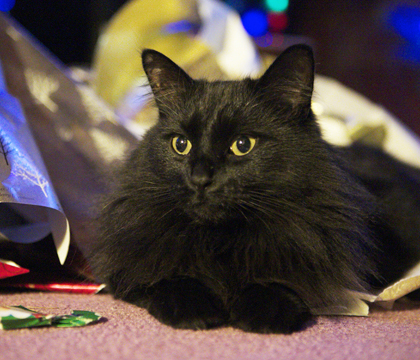
'Tis the season to keep pets safe
To keep family members safe and happy this season, the University of Saskatchewan's Western College of Veterinary Medicine (WCVM) reminds animal owners that prevention is the best medicine at this time of year.
By U of S Communications
Dr. Jordan Woodsworth, wellness veterinarian at the WCVM Veterinary Medical Centre, lists some of the more common household hazards of the season.
Bones are actually bad: Avoid giving bones to dogs or cats, particularly turkey bones. Poultry bones splinter easily and can cause serious injury, while bone fragments can cause intestinal blockages or lacerations.
Sweets and treats: Chocolate and other sweets should not be given to animals. Chocolate contains theobromine, a chemical that can be deadly to cats and dogs; the darker the chocolate, the more toxic to the pet. Fruitcakes containing raisins and currants can be especially harmful because these dried fruits can cause kidney failure in pets.
Poisonous plants: Many popular holiday plants are poisonous to animals including mistletoe, holly, ornamental pepper and Christmas rose. Remember to keep these plants out of reach of pets – especially birds. Poinsettias are not as poisonous to pets or people but can definitely cause irritation to the mouth and stomach if eaten.
Tinsel and trees: Having a Christmas tree and pets can make the holidays interesting. Ensure the tree is well secured and try to place the decorations above paw height. If possible, use non-breakable ornaments and avoid tinsel; cats and dogs may ingest these decorations, potentially risking intestinal damage and infection of the abdominal cavity. Cords for lights should be made inaccessible to pets, especially chewing puppies and exploring kittens.
If you suspect a pet has chewed or ingested something unusual, call a veterinarian immediately. Pet owners can also call the Animal Poison Control Centre's Pet Poison Helpline at 1-800-213-6680 or visit the centre's website www.petpoisonhelpline.com.
Bones are actually bad: Avoid giving bones to dogs or cats, particularly turkey bones. Poultry bones splinter easily and can cause serious injury, while bone fragments can cause intestinal blockages or lacerations.
Sweets and treats: Chocolate and other sweets should not be given to animals. Chocolate contains theobromine, a chemical that can be deadly to cats and dogs; the darker the chocolate, the more toxic to the pet. Fruitcakes containing raisins and currants can be especially harmful because these dried fruits can cause kidney failure in pets.
Poisonous plants: Many popular holiday plants are poisonous to animals including mistletoe, holly, ornamental pepper and Christmas rose. Remember to keep these plants out of reach of pets – especially birds. Poinsettias are not as poisonous to pets or people but can definitely cause irritation to the mouth and stomach if eaten.
Tinsel and trees: Having a Christmas tree and pets can make the holidays interesting. Ensure the tree is well secured and try to place the decorations above paw height. If possible, use non-breakable ornaments and avoid tinsel; cats and dogs may ingest these decorations, potentially risking intestinal damage and infection of the abdominal cavity. Cords for lights should be made inaccessible to pets, especially chewing puppies and exploring kittens.
If you suspect a pet has chewed or ingested something unusual, call a veterinarian immediately. Pet owners can also call the Animal Poison Control Centre's Pet Poison Helpline at 1-800-213-6680 or visit the centre's website www.petpoisonhelpline.com.
